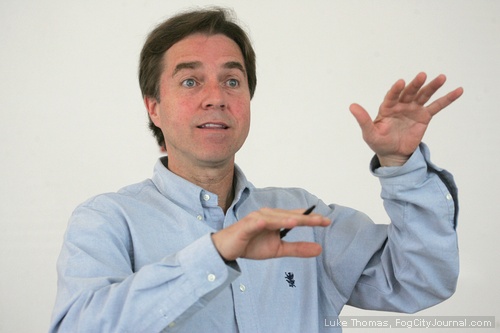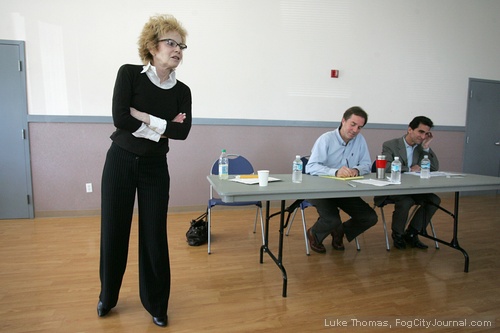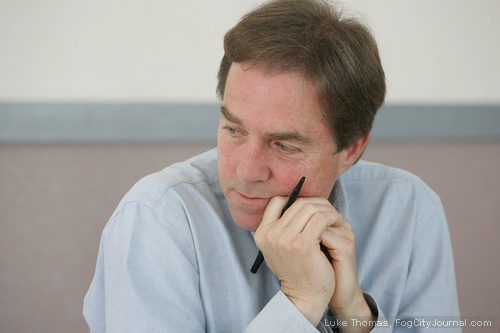
Senate District 3 candidate Joseph Nation
Photos by Luke Thomas
By Luke Thomas
March 10, 2008
Fog City Journal returned to Marin Saturday to attend the Novato Democratic Club Senate District 3 debate with incumbent Senator Carole Migden, Assemblymember Mark Leno and former Assemblymember Joe Nation.
The debate was held to provide club members an opportunity to hear the candidates speak on issues before voting on a candidate endorsement.
Migden won the club’s coveted endorsement with 26 votes. Leno came in second with 6 votes. Nation, who jumped into the race February 9, did not receive any votes.
 
Carole Migden, Joe Nation and Mark Leno.
Following the debate, Fog City Journal had an opportunity to speak with Nation and talk to him about his platform and his campaign.
FCJ: Are you going to campaign in San Francisco?
Nation: “Yes, absolutely. Of Course. I had a great response in Potrero Hill the other day. People came up to me after the debate and said, ‘look, you have my support. You’re the guy focusing on long-term solutions.’ I think the message focusing on climate change and peak oil and alternative energy is something that applies and appeals to everyone across the district, and I’ll work on that just as hard in San Francisco as I will here in the North Bay.”
FCJ: There was a question during the debate about expanding BART and you appeared to not favor the expansion of BART into Marin and Sonoma counties. Can you clarify your position?
Nation: “There’s just not the density. BART is extraordinarily expensive to construct. The only way we can have any sort of mass-transit here is the light rail, the SMART rail system that I authored. It doesn’t (connect to San Francisco) but it connects to Larkspur and that’s the best we’ll be able to do. Then, hopefully, people will be able to transfer to a ferry or transfer to an express bus, go over to Richmond and take BART from there. I think that’s a better solution.”
FCJ: You talk a lot about the impacts of climate change and Co2 emissions. In terms of a long term solution to help reduce Greenhouse gas emissions, does expanding BART from San Francisco to Marin, Sonoma and Napa counties makes more sense, especially if you’re interested in also slashing commute times and reducing traffic along the Highway 101 corridor as well?
Nation: “It only makes sense if you have very high density and you don’t have the density along that rail line. You wouldn’t have the density here to make it make sense. There’s a little bit of density along the 101, but there’s still not enough there. For example, people think of San Francisco as a dense city, in terms of population. I think its 1/8th the density of New York and Manhattan. So you need to get to very high numbers in terms of making that sort of system pay off dividends. I think the commuter rail system we’re talking about (light rail, SMART) makes a lot of sense and I think that’s one of the solutions we’ve got to look too. And instead of having one Bay Area-wide system, I think we’ve got to have a system where you have commuter rail up here that connects to BART, connects to ferries… you’ve got to have a seamlessly integrated system I think.”
FCJ: What are your long-term political goals? Is running for State Senate part of a long-term play to run for Congress?
Nation: “I don’t know if I’m going to do that. I mean, you know, look… I’m focused right now on serving in the State Senate and I’ll tell you one of the reasons why I decided to do this, because, as you know, I’ve been saying ‘no, no, no, I’m not going to do it,’ and there was one conversation that was really important to me that I had, really pivotal in my decision making process. There’s a guy in D.C. He was the Chief of Staff to a U.S. Senator and after I got off the panel on climate change, he said to me, ‘Are you going to run again?’ and I said, ‘no.’ And he said, ‘You need too. We need you.’ And I said, ‘but wait, I’d be running for State Senate, not Congress.’ And he said, ‘you will go to Sacramento and you will become the expert in this country. You will be the most influential person in this country because California is the leading the charge on climate change and alternative energy. We’re going to be slow; we’re going to be behind you. If you do it in California, we’ll adopt that. You will push us.’ And that really had an impact on me. I talk to lots of folks about it. I think he’s right. I think California’s always been a leader. I think we’ll continue to be a leader and, so, that’s my focus. My focus is eight years and by that time if I’m lucky enough to win I’ll be sixty years old and, who knows what I’ll do, maybe I’ll teach (SIC) at Stanford.”
FCJ: You’re currently polling in a statistical dead heat with Mark Leno, how critical will it be for you to campaign in San Francisco to win this race?
Nation: “It’s very important. I don’t have to do as well there as I do here, of course. But polling he did (Mark Leno) and I did shows that I do very well in the North Bay so I don’t have to do as well in San Francisco, but I’m going to work very hard there. I will work very hard with the message that I have about climate change, about energy independence, about fewer imported fossil fuels and so forth and I think that’s something that appeals to everyone.”
FCJ: Going back to the universal healthcare debate, many people say trying to solve the country’s healthcare problem at the local and state level is missing the point, that the problem has to be solved at the Federal level…
Nation: “I agree.”
(FCJ question continued): There’s a Federal bill, HR 676, which is a single-payer solution that expands Medicare to all. Would you support that bill?
Nation: “Expands it to whom? Everyone?”
FCJ: Yes, it expands Medicare to all Americans.
Nation: “Before looking at that bill, I would ask: Number one, what’s the long-term prognosis, and by long-term I mean ten or twenty years, prognosis for Medicare? It is in the red. Medicare has a deficit. The only reason we were able to fully fund Medicare is that we’ve raised the rates a little bit, the payroll tax rate, and then even with that we’re projecting these massive deficits in the future, and they are huge compared to even the social security deficit. I want to focus on the target. The objective here is to have everyone covered, to give everyone high-quality healthcare at an affordable price.”
Editor’s Note: Nation said that he does not support Assemblymember Sheila Kuehl’s single-payer SB 840 bill, which he said would not allow individuals to purchase supplemental insurance. Nation, who had cancer seven years ago said, “Even if I wanted to pay for additional coverage in case I had a recurrence of cancer, that bill (SB 84O) wouldn’t let me do that. I think that’s wrong. I think if people who have a condition they want to guard against, they should be able to buy additional coverage. And again, that single-payer bill would not let people do that.”
FCJ: One glaring advantage Medicare has over private health insurance is the huge reduction of overhead costs. For every dollar spent on private health insurance, 31 percent goes to pay for overhead and profit, whereas Medicare, which is not profit-driven, runs at an efficient three to five percent of total cost.
Nation: “It’s much better. I agree, and you know how you can get there? One of the reasons Medicare is better is because a lot of the records are electronic which would save about 10 to 12 percent (SIC). I had a bill that required electronic medical records in California. The Governor vetoed it.”
“Here’s the system I favor. Again, I think it’s a partnership among businesses, individuals, and employers. I think that you have to have an employer mandate. I have people working on my campaign – I pay for their healthcare. I give them additional money to pay for healthcare even though I don’t have to, because I think it’s my responsibility. So I think every employer ought to have to pay into a pool or pay for their employees, at least pay part of their healthcare. Second, I think individuals should have to have healthcare, an individual mandate. Same thing Obama and Clinton support at the national level. It’s not a radical idea. It was a couple of years ago when I introduced it. It’s not so much anymore. That means that you have to go out and buy it. If you don’t have the money, if you’re below 400 percent of poverty, you get a subsidy to buy it, which makes all the sense in the world. And then you have government come in and the government role probably is some kind of regulation unless you can force health insurers to bring down costs. The reason costs are skyrocketing isn’t because of these obscene profits, but the real reason for cost inflation is that we’re all getting older. It’s about demographics. It’s about technology in particular. We have to recognize that technology costs. Would I put a cap on profit? Absolutely, I’d be willing to do that. But, again, you got to focus on the real source of the cost increases and it’s not administrative costs. It’s other things. It really is.”
FCJ: What’s your position on marriage equality, same-sex marriage?
Nation: “I’m a co-author of it and I vote for it every single time. If I’m the State Senator, I’ll author that bill.”
FCJ: What do you consider – in terms of San Francisco voters – to be the weakest area in your platform?
Nation: “Gosh, I don’t know. I don’t know if there’s a specific area. There was a heliport issue the other day at Potrero Hill. I don’t know a lot about that. I know about the process… I’m one of these people who likes to go out and check something and look at it and look at the landscape and geography… I wasn’t able to do that. So, I don’t know, I can’t give you a good answer.”
FCJ: Very good. Thank you for taking the time to speak with Fog City Journal.
 
More Info
Joe Nation at Wikipedia
Joe Nation’s website
Sonoma-Marin SMART Area Rail Transit
SB 840
BART History



 The Hunger Site
The Hunger Site
March 24, 2008 at 8:09 am
God bless Joseph. He always brought an apple to the teacher at school, and he has always been very attentive to his personal appearance when other people often don’t care. The beautiful photo at the end of him sitting on a toilet argues for him that he is a seasoned politician. There should have been a caption under it: “I don’t know, I can’t give you a good answer.â€
March 16, 2008 at 8:19 am
Joe’s game is to get elected by a minority, an elitism of its own, as he assumes that his own will shall supersede public wisdom by manipulation. Some say he got in office by passing himself off as a progressive among progressives. His six years in the state assembly were quiet, except for a traffic accident. He passed a law for the birds, supported the war in Iraq, extinguished hopes for state health care – he was a good Republican and probably enjoys back room support. How else might he take public office so lightly? I’ve him and he’s a slick, not a well.
March 11, 2008 at 10:29 pm
“Believe me, folks, oil will be us for generations to come.”
Freud(oil)ian slip?
March 10, 2008 at 6:45 pm
If you believe in the whole “Peak Oil Theory” I suggest that you read Greg Palast’s “Armed Madhouse”. It pretty much blows that whole theory out of the water. Venezuela alone is in the process of certifying 230 billion barrels of oil. That would give it more oil that Saudi Arabia. Believe me, folks, oil will be us for generations to come.
By the way, Luke, it would be great if you could interview the candidates for Supervisor, too.